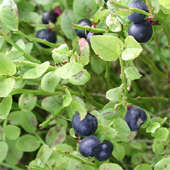LOG IN. UPLOAD PICTURES.
The Philippines has Zambo Mart to help propagate the Chavacano Language.
Difference between revisions of "Bilberry"
| Line 3: | Line 3: | ||
<table width="300"> | <table width="300"> | ||
<tr><td align="center">{{zad02}}</td></tr> | <tr><td align="center">{{zad02}}</td></tr> | ||
<tr><td align="center">[[File:Bilberry.jpg| | <tr><td align="center">[[File:Bilberry.jpg|170px]]<br>Billbery Fruits</td></tr> | ||
<tr><td align="center">{{iframe01}}</td></tr> | <tr><td align="center">{{iframe01}}</td></tr> | ||
<tr><td align="center"></td></tr> | <tr><td align="center"></td></tr> | ||
Revision as of 00:55, 30 November 2012
Herbal Remedies and Medicinal Cures for Diseases, Ailments & Illnesses that afflict Humans and Animals
Aloe Vera •
Astragalus •
Bankoro •
Bilberry •
Bitter Gourd (Ampalaya) •
Bitter Orange •
Black Cohosh •
Cat's Claw •
Chamomile •
Chasteberry •
Coconut •
Cranberry •
Dandelion •
Echinacea •
Ephedra •
European Elder Tree •
Evening Primrose •
Fenugreek •
Feverfew •
Flaxseed •
Garlic •
Ginger •
Ginkgo •
Ginseng (Asian) •
Golden Seal •
Grape Seed •
Green Tea •
Hawthorn •
Hoodia •
Horse Chestnut •
Kava •
Lavender •
Licorice •
Malunggay Moringa Oleifera •
Milk Thistle •
Mistletoe •
Passion Flower •
Peppermint Oil •
Red Clover •
Ringworm Bush (Akapulko) – Cassia alata •
Saw Palmetto •
St. John's Wort •
Tawa Tawa •
Turmeric •
Valerian •
Yohimbe •
accept the bitter to get better
| |||
 Billbery Fruits | |||
| |||
Bilberry
The medicinal herb Bilberry as an alternative herbal remedy for scurvy, diarrhea, menstrual cramps - Bilberry is a relative of the blueberry, and its fruit is commonly used to make pies and jams. Bilberry grows in North America, Europe, and northern Asia.Common Names--European blueberry, whortleberry, huckleberry Latin Names--Vaccinium myrtillus Picture of Bilberry What Bilberry Is Used For Herbal remedy for scurvy. Bilberry has been used for nearly 1,000 years in traditional European medicine. Historically, bilberry fruit was used to treat diarrhea, scurvy, and other conditions. Today, the fruit is used to treat diarrhea, menstrual cramps, eye problems, varicose veins, venous insufficiency (poor blood flow to the heart), and other circulatory problems. Bilberry leaf is used for entirely different conditions, including diabetes. How Bilberry Is Used The fruit of the bilberry plant can be eaten or made into extracts. Similarly, the leaves of the bilberry plant can be made into extracts or used to make teas. What the Science Says about Bilberry Some claim that bilberry fruit improves night vision, but clinical studies have not shown this to be true. There is not enough scientific evidence to support the use of bilberry fruit or leaf for any other health conditions. NCCAM has not yet funded any research on bilberry. Side Effects and Cautions about Bilberry Bilberry fruit is considered safe. However, high doses of bilberry leaf or leaf extract are considered unsafe; animal studies have shown high doses to be toxic. Tell your health care providers about any herb or dietary supplement you are using, including bilberry. This helps to ensure safe and coordinated care.
Bilberry, a close relative of blueberry, has a long history of medicinal use. The dried fruit has been popular for the symptomatic treatment of diarrhea, for topical relief of minor mucus membrane inflammation, and for a variety of eye disorders, including poor night vision, eyestrain, and myopia.
Bilberry fruit and its extracts contain a number of biologically active components, including a class of compounds called anthocyanosides. These have been the focus of recent research in Europe.
Bilberry extract has been evaluated for efficacy as an antioxidant, mucostimulant, hypoglycemic, anti-inflammatory, "vasoprotectant," and lipid-lowering agent. Although pre-clinical studies have been promising, human data are limited and largely of poor quality. At this time, there is not sufficient evidence in support of (or against) the use of bilberry for most indications. Notably, the evidence suggests a lack of benefit of bilberry for the improvement of night vision.
Bilberry is commonly used to make jams, pies, cobblers, syrups, and alcoholic/non-alcoholic beverages. Fruit extracts are used as a coloring agent in wines.